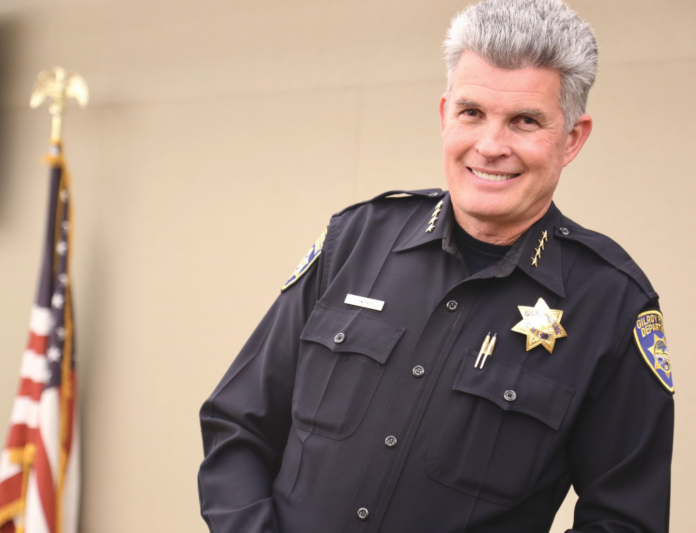After a gang shooting at a Monterey Road gas station in the 1990s wounded innocent passersby, Gilroy officials realized they had a growing gang problem.
Scot Smithee, who was recently appointed as the police department’s interim chief, was one of the officers called to action in what they called an “anti-crime” unit, one in which police were pulled from answering calls for service and went into action focusing on gangs.
They published a weekly “Lucky 7” report in this newspaper that listed the worst known gang members, and they stalked them, staking out their houses and following them, particularly when a gang member was the victim of a crime.
“We had zero tolerance policy for people on that list,” Smithee said. “If you made that list, you didn’t get warnings. Eventually, what would happen is you would take someone off that list and now they’re gone, they would go to jail and it made other people think twice about whether they wanted to start.”
If a gang member was shot, the police focused on the members of the victim’s gang.
“I think that It’s pretty hard to go out and get revenge when there’s a policeman at your door,” said Smithee.
It’s one of the things he’s most proud of in his 30-year career, which ended in 2015. One of his goals as he works now while the city tries to fill the chief’s job full time, is getting officers out of their cars and interacting with more people.
The results are tangible. Gilroy has had two murders in the past two years. Salinas, three times bigger, has had 75.
“If you’re not quick to get on this and address it, it can get away from you and then you are chasing your tail,” said Smithee. “We can’t have all these guys getting tied up on calls for service. We need to get them working on proactive enforcement.”
Smithee wants to see more of this in his time here. He wants to get a “coffee with a cop” program going, where people can just meet and talk to officers, he wants to get the mounted unit riding horses more downtown and he wants to beef up high-tech crime fighting programs that might free up officers from the routine of answering call after call.
In his 30 years on the force, Smithee was part of every unit the department has, notably one that controls the budget, something he will be working on now. He’s been acting and interim chief before. He left in 2015 and did volunteer work at Glenview School’s reading program, coordinating building at the Compassion Center and teaching leadership, ethics and vehicle operations at several police academies.
He didn’t apply for the job, but was asked to take it. It turns out it’s a financial bane, not gain, even at the $90 an hour it pays him. He’d make more money, he said, by staying retired and teaching—but there was something more than the money that brought him back.
“The city and the department are, to me, a part of my family,” he said. “I’ve been here for so long and know so many people that I felt that if they needed me, I could bridge the gap. I didn’t think I could say no, even if it’s not financially beneficial.”
City Administrator Gabe Gonzalez said Smithee had “the traits, experience and leadership to assist me and the department in this transitional time.” The city will conduct a nationwide search for a replacement for the job that pays $185,000 a year.
Even though he’s only 52, he’s not actively seeking the top spot, but would likely stay on as long as they need him. He thinks, however, that the department will find someone else to do the job well.
“In this job, if you make it 30 years, that’s an accomplishment. And I made it 30 years,” he said.
Smithee Facts:
***Scot doesn’t know why his parents left off the second ‘t’ normally on that name. “To be different?” he said.
***Smithee was famous in 2004 for saving seven people when a Hawaiian fishing boat capsized. His actions diving underwater and rescuing them from the boat were reenacted on Discovery Channel’s “True Heroes” TV show.
***Smithee is 6-feet, 8-inches tall, but no, he doesn’t play basketball. As a freshman, they wouldn’t let him play on JV because he was too tall. They forced him onto varsity, but he never developed the skills to keep up.
***Smithee’s family has been in the construction business and his expertise there helped in designing the new police building. He jokes that he put the door sensors at the level of his wallet.
***Scot became a reserve officer in 1984 right out of high school and paid his own way through the police academy in 1985. He was hired in 1986.
***Smithee never thought he wanted to be a cop until a friend talked him into trying the department’s cadet program. Once he did, he never looked back. He’d look at his watch waiting for his construction jobs to end, but look at it when he was in the department hoping he could stay longer.














